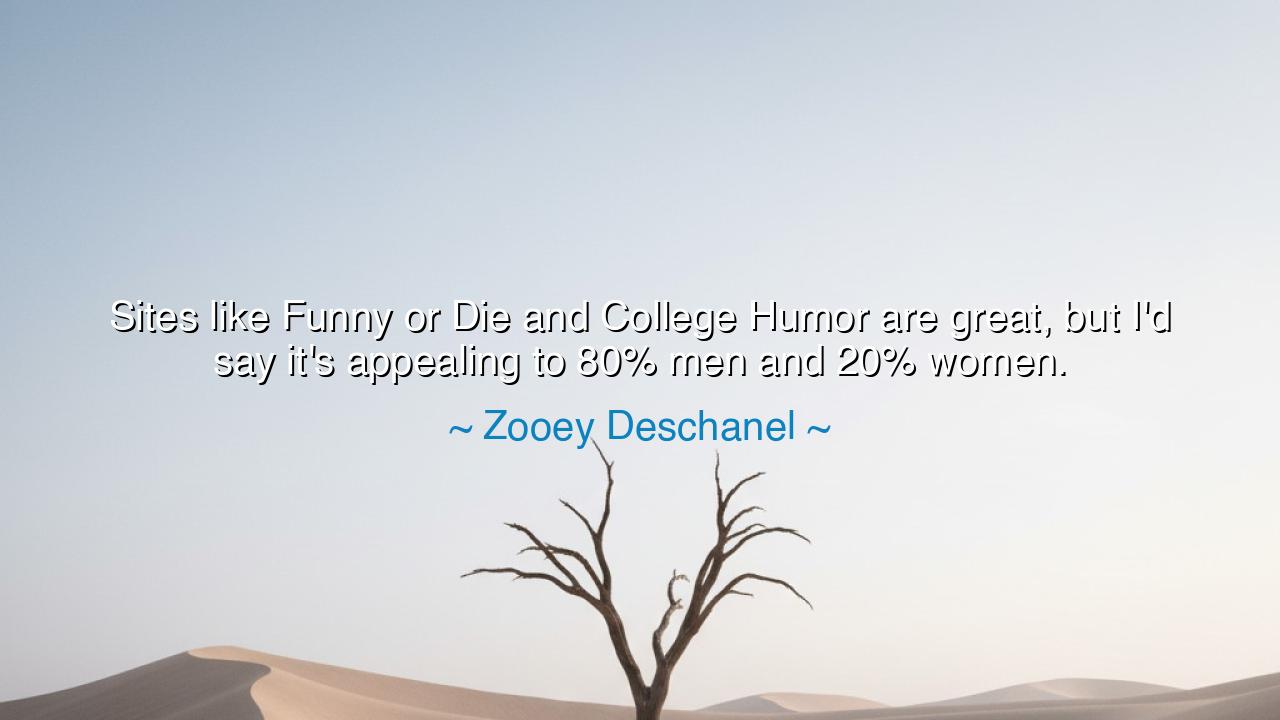
Sites like Funny or Die and College Humor are great, but I'd say
Sites like Funny or Die and College Humor are great, but I'd say it's appealing to 80% men and 20% women.






Hear, O Children of the Earth, the words of Zooey Deschanel, a woman of wit and wisdom, who, in reflecting on the vast landscape of entertainment, spoke of sites such as Funny or Die and College Humor, declaring: "Sites like Funny or Die and College Humor are great, but I'd say it's appealing to 80% men and 20% women." In these words, we find the subtle truth about the nature of humor, and the way in which it is shaped by culture, gender, and the expectations of those who consume it. The truth she speaks is not one of mere numbers, but a profound insight into how we, as a society, shape and define the things that make us laugh, and to whom those things are made accessible.
Let us pause, then, and reflect on the meaning of her words. What does it mean that such sites—sources of mirth, entertainment, and laughter—speak so predominantly to one gender? It is not just a matter of audience numbers, but a reflection of the deeper currents that flow beneath the surface of our cultural landscape. Humor, like all forms of art, is often shaped by the perspectives and experiences of those who create it. If we look at the early forms of humor, from the tragedies and comedies of ancient Greece to the theaters of Rome, we see that humor was often used to convey the truths of society—both to entertain and to provoke. Yet, in all these early forms, there was a tendency to cater to the expectations of a predominantly male audience. Women—though capable of great wit and humor—were often sidelined or excluded from the most celebrated comedic spaces.
Consider, for instance, the ancient Greeks, whose comedy was often a reflection of the society’s views on gender and power. Aristophanes, the great comic playwright, crafted works that both mocked and celebrated the excesses of men, yet the women of his plays were often depicted as caricatures, their humor secondary to the men who dominated the stage. It was not until much later in history, with the rise of female playwrights and comedians, that the female voice in humor began to gain prominence. Charlotte Perkins Gilman, a brilliant writer and social critic, used humor to challenge the norms of her time, but the world was slow to embrace her. Thus, we see that the landscape of comedy—just as in other fields—has been gendered, shaped by the hands of those who have historically held the power.
Zooey Deschanel’s words are a reflection of this cultural divide, a recognition that comedy, even in its most modern forms, has often been created through the lens of male experience. Sites like Funny or Die and College Humor, while offering moments of levity and laughter, often cater to the sensibilities of men—those who have traditionally been at the forefront of comedic writing and performance. Yet, in the midst of this, Deschanel's observation serves as a call to arms. She reminds us that humor is not a one-size-fits-all garment, that it is something that should be accessible and meaningful to all.
And in this, there is a lesson for us, O Children of the Earth. The world is not made richer by the voices of a single group, but by the harmonious blend of many. Just as laughter transcends borders and cultures, so too must it transcend gender. The comedy of one era may speak to the experiences of a few, but the true power of humor lies in its ability to reach across barriers, to speak to the hearts of all people, regardless of their gender, their race, or their background. If we are to build a future in which laughter unites rather than divides, we must ensure that the voices creating that humor are diverse, that they represent the many faces of humanity.
In the days of old, Shakespeare wrote plays that were both universal in their appeal and deeply specific in their reflections of society. His works were not bound by the norms of his time, and in them, women found voice and agency. His heroines, such as Portia from The Merchant of Venice, wield their humor as a weapon, as a means to navigate a world not made for them. The lesson here is clear: humor is a powerful tool, and when it is wielded by all people, it becomes a bridge that connects the disparate and the divided. Just as Shakespeare’s plays were enriched by the contributions of women on stage, so too must modern comedy evolve to embrace the full spectrum of human experience.
And so, O Children of the Earth, let us carry this wisdom with us: the creation of humor is not a privilege for the few, but a shared responsibility for all. We must create with the understanding that the laughter we share must be broad enough to encompass the voices of all people, from all walks of life. We must seek to craft comedy that is not merely an expression of one group’s experience, but a celebration of the diversity of the human condition. And in doing so, we will build a world where laughter knows no bounds, where the joy of comedy unites us all.






AAdministratorAdministrator
Welcome, honored guests. Please leave a comment, we will respond soon